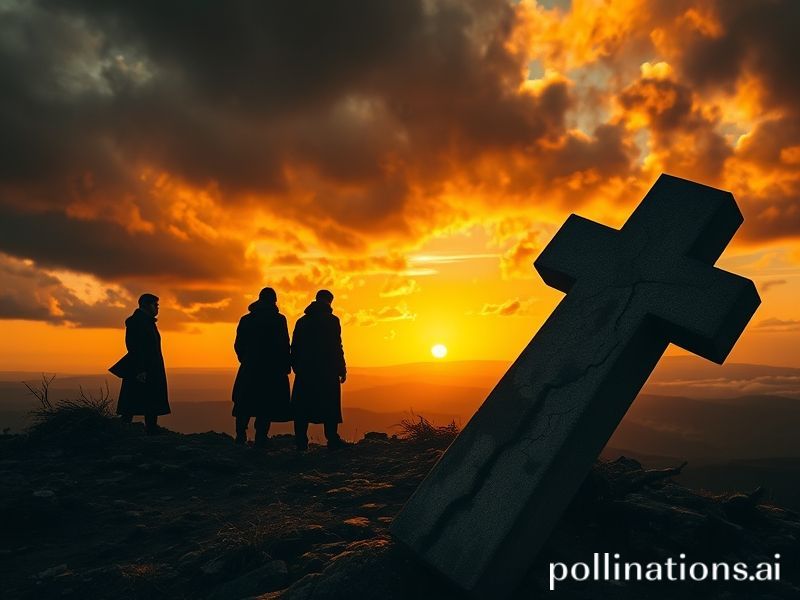From Birmingham Basements to Global Breakdown: How Black Sabbath Became the UN’s Unofficial Anxiety Anthem
Ozzy’s Lullaby Goes Global: How Four Brummies from the Black Country Accidentally Invented the Soundtrack to Modern Dystopia
By the time the first distorted chord of “Black Sabbath” crawled out of Tony Iommi’s amputated fingertips in 1970, the planet was already busy rehearsing its own apocalypse. Vietnam was on television nightly, the Cold War had a polite but persistent doomsday clock, and somewhere in the Middle East oil ministers were discovering they could raise prices faster than a teenager’s blood pressure. Into this planetary anxiety attack stepped four working-class Englishmen with a band name swiped from a Boris Karloff film, offering the world a new genre: heavy metal, or as your local customs officer might classify it, “Industrial-grade anxiety with optional feedback.”
Fifty-four years later, the riff that launched a thousand Marshall stacks has become the lingua franca of global discontent. From Jakarta basement gigs to São Paulo evangelical protests, Black Sabbath’s DNA is detectable in every distorted power chord that says, “Yes, the sky is falling, but let’s at least give it a proper soundtrack.” The irony, of course, is that four guys who originally just wanted to avoid factory jobs in Birmingham have, in essence, provided the elevator music for humanity’s ongoing descent into climate anxiety, crypto scams, and TikTok theology.
Take South Korea, where Sabbath tribute nights in Seoul now outnumber kimchi varieties. Local promoters report that office workers show up in surgical masks—not for pandemic protocol, but because the air quality index makes the original 1970 smog look artisanal. Meanwhile in Russia, state media periodically denounces heavy metal as Western decadence, then quietly licenses “Iron Man” for military recruitment ads. The Kremlin, it seems, appreciates a good drone riff when trying to sell actual drones.
Global supply chains have only amplified the absurdity. The signature “Sabbath sound” depends on Iommi’s downtuned Gibson SG, necessitated when the guitarist lost two fingertips in a sheet-metal accident. Today those missing digits have become a metaphor for every worker sacrificed on the altar of industrial efficiency. Bangladeshi garment factories hum along to bootleg Sabbath playlists; Amazon delivery drivers wear earbuds blasting “Paranoid” while racing algorithms that measure bathroom breaks. Somewhere, a Foxconn intern is soldering iPhone motherboards to the rhythm of “Children of the Grave,” blissfully unaware of the punchline.
Even the Vatican—an institution not historically known for headbanging—has weighed in. A 2022 Jesuit journal article praised Sabbath for “unflinching moral realism,” which is Vatican-speak for “At least they admit hell exists and we’re probably heading there.” Meanwhile in Saudi Arabia, state censors allow instrumental Sabbath tracks to accompany drone light shows, because nothing says “Vision 2030” like a laser outline of Ozzy’s bat-biting silhouette over Riyadh.
The environmental calculus is equally bleak-hilarious. Vinyl reissues of classic Sabbath albums now come with carbon-offset certificates, essentially asking Mother Earth to forgive the coal burned to press the very songs that warned her about getting burned. Greta Thunberg was spotted wearing a vintage “Master of Reality” T-shirt at a climate summit, prompting Fox News to accuse her of worshipping Satan—an accusation Sabbath themselves haven’t heard since 1983.
Yet for all the globalization, the core message remains stubbornly local: life is short, systems are rigged, and the factory whistle is always about to blow. Whether you’re a gig-worker in Lagos or a hedge-fund quant in Greenwich, the opening tritone of “Black Sabbath” still sounds like Monday morning. And perhaps that’s the ultimate international triumph: a song written in the shadow of British smokestacks now serves as the shared ringtone for late-capitalist dread. The planet may collapse, but at least it will do so in 4/4 time, with a killer solo.
So crank up the volume, fellow inmates of Spaceship Earth. The next time you hear “War Pigs” bleeding from a tinny smartphone speaker in a refugee camp or a Wall Street elevator, remember: we’re all just extras in the longest, loudest, most profitable apocalypse ever sold. Black Sabbath gave us the soundtrack; humanity simply provided the endless reprise.







